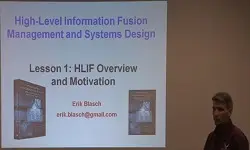IMPROVING INFERENCE FOR SPATIAL SIGNALS BY CONTEXTUAL FALSE DISCOVERY RATES
Martin Gölz, Abdelhak M. Zoubir, Visa Koivunen
-
Members: FreeSPS
IEEE Members: $11.00
Non-members: $15.00Length: 00:15:12
A spatial signal is monitored by a large-scale sensor network. We propose a novel method to identify areas where the signal behaves interestingly, anomalously, or simply differently from what is expected. The sensors pre-process their measurements locally and transmit a local summary statistic to a fusion center or cloud. This saves bandwidth and energy. The fusion center or cloud computes a spatially varying empirical Bayes prior on the signal?s spatial behavior ti improve the hypothesis testing. The spatial domain is modeled as a fine discrete grid. The contextual local false discovery rate is computed for each grid point. A decision on the local state of the signal is made for each grid point, hence, many decisions are made simultaneously. A multiple hypothesis testing approach is used with false discovery rate control. The proposed procedure estimates the areas of interesting signal behavior with higher precision than existing methods. No tuning parameters have to be defined by the user.

